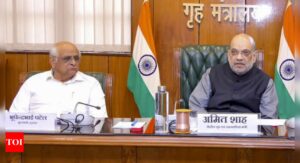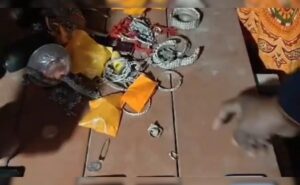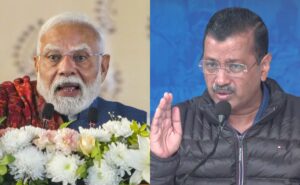Ready to punish adversaries: Army, IAF chiefs | India News – Times of India

NEW DELHI: India has the capability, and more importantly the will, to respond to an adversary at a level that it deems appropriate and to impose its own escalation matrix, IAF chief Air Chief Marshal V R Chaudhari said on Tuesday.
Army chief General Manoj Pande, in turn, said the armed forces will also continue to be operationally prepared to fight a two-front war if required, though India’s attempt would be to avoid such a situation.
Speaking at an event here, ACM Chaudhari said, “Air power has the capability to deter, defend and if required punish an adversary in a conflict. Even at the lower end of the spectrum, during ‘no war, no peace’ and peacetime situations, IAF has been and will continue to contribute effectively in the pursuit of our national objectives.”
Asked about the possibility of a two-front war with China and Pakistan, Gen Pande said, “While the attempt will be across all domains to avoid a two-front situation, I believe we still need to be prepared…how to utilise the resources.”
“We have plans in place, depending on which of the two will be the primary front and which one secondary. In terms of our preparedness levels, we will continue to be prepared to fight a two-front war,” he said.
India has taken “significant strides” in border infrastructure development over the last 8-10 years to reduce the asymmetry with China, be it in terms of improving roads and surface connectivity, building more advanced landing grounds and helipads, boosting communication and power connectivity. “But yes, more needs to be done…As far as infrastructure development goes, we are on the right track,” Gen Pande said.
Both the chiefs stressed the need for self-reliance in defence production and technologies, which has been reinforced by the ongoing Russia-Ukraine war. They said the armed forces are moving in the right direction as far as development of capabilities across the full spectrum of conflict as well as induction of modern and niche disruptive technologies is concerned.
Army chief General Manoj Pande, in turn, said the armed forces will also continue to be operationally prepared to fight a two-front war if required, though India’s attempt would be to avoid such a situation.
Speaking at an event here, ACM Chaudhari said, “Air power has the capability to deter, defend and if required punish an adversary in a conflict. Even at the lower end of the spectrum, during ‘no war, no peace’ and peacetime situations, IAF has been and will continue to contribute effectively in the pursuit of our national objectives.”
Asked about the possibility of a two-front war with China and Pakistan, Gen Pande said, “While the attempt will be across all domains to avoid a two-front situation, I believe we still need to be prepared…how to utilise the resources.”
“We have plans in place, depending on which of the two will be the primary front and which one secondary. In terms of our preparedness levels, we will continue to be prepared to fight a two-front war,” he said.
India has taken “significant strides” in border infrastructure development over the last 8-10 years to reduce the asymmetry with China, be it in terms of improving roads and surface connectivity, building more advanced landing grounds and helipads, boosting communication and power connectivity. “But yes, more needs to be done…As far as infrastructure development goes, we are on the right track,” Gen Pande said.
Both the chiefs stressed the need for self-reliance in defence production and technologies, which has been reinforced by the ongoing Russia-Ukraine war. They said the armed forces are moving in the right direction as far as development of capabilities across the full spectrum of conflict as well as induction of modern and niche disruptive technologies is concerned.







